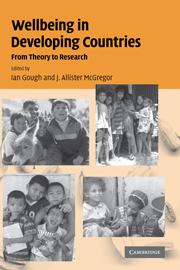Book contents
- Frontmatter
- Contents
- Figures
- Tables
- Notes on contributors
- Acronyms
- Preface
- Introduction
- 1 Theorising wellbeing in international development
- Part I Human needs and human wellbeing
- Part II Resources, agency and meaning
- Part III Quality of life and subjective wellbeing
- Conclusion: researching wellbeing
- References
- Index
Preface
Published online by Cambridge University Press: 22 September 2009
- Frontmatter
- Contents
- Figures
- Tables
- Notes on contributors
- Acronyms
- Preface
- Introduction
- 1 Theorising wellbeing in international development
- Part I Human needs and human wellbeing
- Part II Resources, agency and meaning
- Part III Quality of life and subjective wellbeing
- Conclusion: researching wellbeing
- References
- Index
Summary
Wellbeing is a term much in vogue. It is to be found in many diverse places: from the lifestyle pages of newspaper supplements; to health food and spiritual healing shops; to government policy documents. For some it is a broad and attractive term, for others it is messy, imprecise and conceptually dangerous. The arguments contained in this book suggest that ‘love it or hate it’ the social sciences globally must confront the challenges it poses. Wellbeing is now commonly used by governments and politicians in developed countries as the policy documents and legislation of the UK, Europe and North America indicate. In England, the Local Government Act of 2000 charges local authorities with the responsibility of ‘promoting well-being’, while in Scotland the Local Government Act of 2003 grants local authorities new power to ‘advance well-being’. The term features less commonly in our thinking and policy in relation to developing countries. For some it may appear that wellbeing is a luxury that developing countries, and particularly the poor men, women and children who live in them, could do without. We argue not.
Experiences of living and working with people in a wide range of developing countries tell us that they have as vivid and valid notions of wellbeing as do people in wealthier countries, where it appears more possible to buy one's way to wellbeing.
- Type
- Chapter
- Information
- Wellbeing in Developing CountriesFrom Theory to Research, pp. xxi - xxivPublisher: Cambridge University PressPrint publication year: 2007

